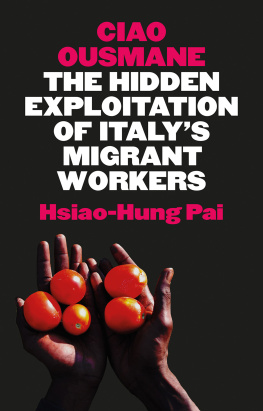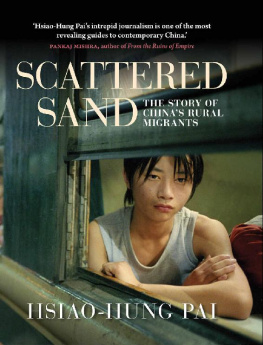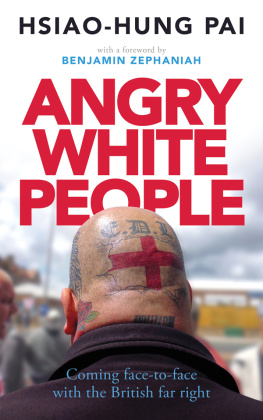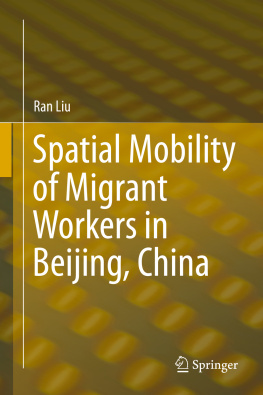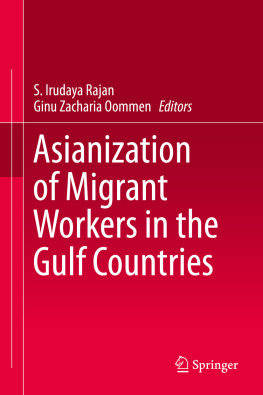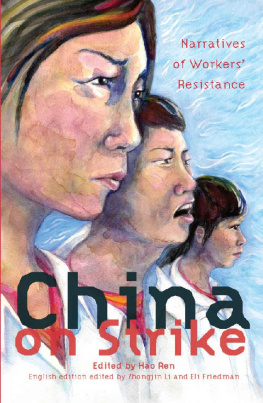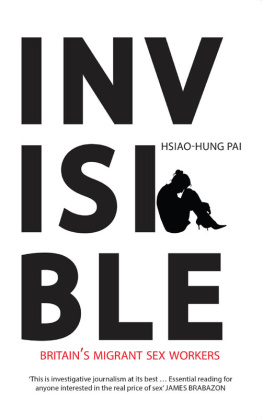Hsiao-Hung Pai - Ciao Ousmane: The Hidden Exploitation of Italys Migrant Workers
Here you can read online Hsiao-Hung Pai - Ciao Ousmane: The Hidden Exploitation of Italys Migrant Workers full text of the book (entire story) in english for free. Download pdf and epub, get meaning, cover and reviews about this ebook. year: 2021, publisher: C. Hurst & Co., genre: Detective and thriller. Description of the work, (preface) as well as reviews are available. Best literature library LitArk.com created for fans of good reading and offers a wide selection of genres:
Romance novel
Science fiction
Adventure
Detective
Science
History
Home and family
Prose
Art
Politics
Computer
Non-fiction
Religion
Business
Children
Humor
Choose a favorite category and find really read worthwhile books. Enjoy immersion in the world of imagination, feel the emotions of the characters or learn something new for yourself, make an fascinating discovery.
- Book:Ciao Ousmane: The Hidden Exploitation of Italys Migrant Workers
- Author:
- Publisher:C. Hurst & Co.
- Genre:
- Year:2021
- Rating:4 / 5
- Favourites:Add to favourites
- Your mark:
- 80
- 1
- 2
- 3
- 4
- 5
Ciao Ousmane: The Hidden Exploitation of Italys Migrant Workers: summary, description and annotation
We offer to read an annotation, description, summary or preface (depends on what the author of the book "Ciao Ousmane: The Hidden Exploitation of Italys Migrant Workers" wrote himself). If you haven't found the necessary information about the book — write in the comments, we will try to find it.
Ciao Ousmane: The Hidden Exploitation of Italys Migrant Workers — read online for free the complete book (whole text) full work
Below is the text of the book, divided by pages. System saving the place of the last page read, allows you to conveniently read the book "Ciao Ousmane: The Hidden Exploitation of Italys Migrant Workers" online for free, without having to search again every time where you left off. Put a bookmark, and you can go to the page where you finished reading at any time.
Font size:
Interval:
Bookmark:

HSIAO-HUNG PAI
The Hidden Exploitation of Italys Migrant Workers

HURST & COMPANY, LONDON
First published in the United Kingdom in 2021 by
C. Hurst & Co. (Publishers) Ltd.,
41 Great Russell Street, London, WC1B 3PL
Hsiao-Hung Pai, 2021
All rights reserved.
The right of Hsiao-Hung Pai to be identified as the author of this publication is asserted by her in accordance with the Copyright, Designs and Patents Act, 1988.
Distributed in the United States, Canada and Latin America by Oxford University Press, 198 Madison Avenue, New York, NY 10016, United States of America.
A Cataloguing-in-Publication data record for this book is available from the British Library.
ISBN: 9781787384699
www.hurstpublishers.com
For the unbeatable Dave, with all my love
All workers names have been changed.
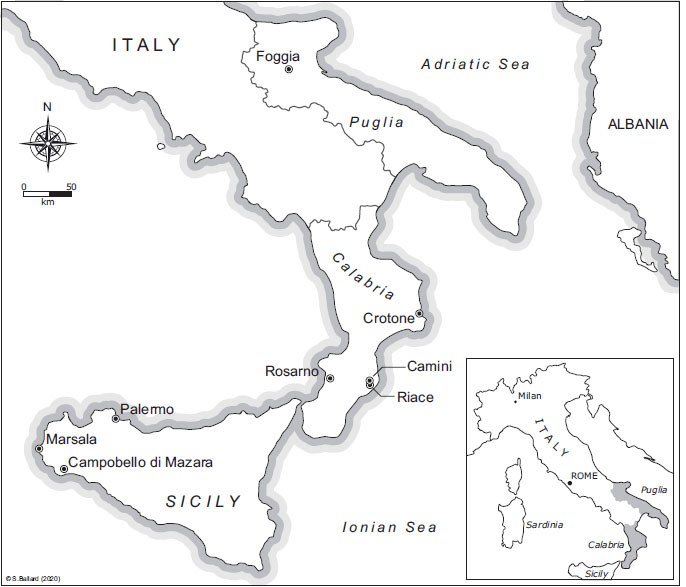
Southern Italy
As I write, in late March 2020, a new infectious disease, for which there is as yet no vaccine or effective treatment, is spreading in multiple countries around the world. While mortalities in Italy are the highest in Europe, surpassing China, other countries are fast catching up. For many weeks now, those of us Europeans whose work is deskbound have had the luxury of packing up our offices and working from home. It goes without saying that workers in the emergency services and other key sectors simply cannot recreate the working day in their living rooms. Not just the doctors, nurses, ambulance drivers, paramedics, pharmacists, care workers and teachers, but also the caterers, cleaners, those employed in warehousing, sanitation, dairy farming, the slaughtering and processing of livestock, fisheries, cockle-picking, vegetable and fruit harvesting, and general food distribution: they cannot go to war on the virus (British prime minister Boris Johnsons favourite phrase) through social distancing strategies and self-isolation.
Maybe, just maybe, we will emerge from this global pandemic with a heightened awareness of the omert about suffering that Hsiao-Hung Pai identifies as scarring the lives of our fellow human beings living in Europe in abandoned farmhouses and shack-and-tent cities. They labour in Italian fieldsan estimated 405,000 of themin subhuman conditions, imprisoned within a cynical quasi-legal system designed to keep them out of sight, out of mind. If the current situation on the Aegean island of Lesvos is anything to go by, Africans in places like Sicily, and the doctors who attend them, could soon find themselves vilified by the Far Right as the carriers of Covid-19.
In agri-food production and distribution, globalisation has long since opened up a global food market, but the fruit and vegetable pickers who are the lynchpin of Italys food supply-chain are invisible, as the state is forever diluting their presence by pushing them further underground. They harvest the asparagus, mandarins, grapes, olives, and tomatoes (the last two known as black gold and red gold respectively) in Italy. In the Made in Italy context, it is no longer Italians (once emigrants themselves), but postcolonial subjects, mainly from sub-Saharan Africa, who are doing the makingoften having escaped torture, forced labour and detention in Libya and risking the perilous journey across the Mediterranean Sea. These Africans are not the invading scroungers of popular myth. They are men and women of immense courage, with coping mechanisms and inner resources that many of us settled Europeans could only dream of. They left their homes in, say, Senegal, Nigeria, Gambia or Mali because of a mixture of IMF and World Bank imposed Stabilisation and Structural Adjustment Programmes, climate change, and neoliberal cuts to public spending and public services. This gave them no choice but to sacrifice themselves, for the good of their families, by seeking a livelihood elsewhere.
But how is this sacrifice rewarded? Instead of valuing their contribution to society, Europe passes laws and policies that dehumanise and disenfranchise them. Confined to segregated agricultural spaces, and rendered collectively homeless in a field, they are usually unable to find work in other sectors because this would bring them in contact with the Italian public. They were labourers in the fields and customers in the shops, and nothing else, records Hsiao-Hung Pai, in this breathtaking, hard-hitting take on the lives of agri-workers in Italy. Her anger may be controlled, but it is palpable when she writes of Mohammed, No local person would even look him in the eye; it was as if he had no soul.
The first step taken is to imprison migrants within an asylum and residence permit system that is designed to enforce economic exploitation and racial exclusion, a form of violence by design. Here, housing, or rather the lack of it, is the key instrument for maintaining the conditions of super-exploitation: in the Catch-22 world of migration law, an offer of a work contract requires a residence permit, but a residence permit requires an address. It would seem that international law and indeed the countrys own constitution have no jurisdiction in Italy. The 1948 UN Declaration of Human Rights and the 1966 International Covenant on Economic Social and Cultural Rights (ICESCR) both recognise the human right to adequate housing for oneself and ones family. And the revised Italian Constitution (2001) acknowledges minimum state provision of housing as a core component of human dignity.
In the context of the Covid-19 pandemic, when we are constantly being told that, in this war on the virus, we are all in it together, the lack of housing perhaps foreshadows worse to come. In centuries past, plagues and epidemics would be quickly followed by mass famines. Though we do not expect anything on this catastrophic scale today, Covid-19 has already been accompanied by food scarcity. In London, as I write, several emergency food aid charities have been forced to close, finding it impossible to replenish stocks, even as thousands more people are turning to them for help. The rich may not be protected from disease, but they do not live amongst the marginalised; they have no idea what existence is like in tents and shacks where every day is a fight for survival against hunger, hypothermia, and homelessness. For, as Giorgio Agamben has written, the camp, where people are defined as having lives not worth living and are vulnerable to early death and state killings, long preceded the Holocaust.
And as Hsiao-Hung Pai, who provides chapter and verse on EU policies, knows only too well the treatment of migrant agricultural workers in Italy and the use of the law to set exploitation in situ are not exceptionseither in Europe or globally. The plastic greenhouses for tomatoes, cucumbers and peppers of the Costa del Sol are worth 2 billion a year to supermarkets, profits made on the backs of migrant workers from Morocco, West Africa and Eastern Europe. In California, the labour of Mixteco migrants from the mountain villages of Oaxaca ensures not only that American consumers eat strawberries all year round, but also that producers and distributors such as Driscolls and Walmart, reap incredible profits.
But what is exceptional about the Italian context is the way in which this racial super-exploitation echoes the countrys colonial and fascist history, and its denial of that history.
Font size:
Interval:
Bookmark:
Similar books «Ciao Ousmane: The Hidden Exploitation of Italys Migrant Workers»
Look at similar books to Ciao Ousmane: The Hidden Exploitation of Italys Migrant Workers. We have selected literature similar in name and meaning in the hope of providing readers with more options to find new, interesting, not yet read works.
Discussion, reviews of the book Ciao Ousmane: The Hidden Exploitation of Italys Migrant Workers and just readers' own opinions. Leave your comments, write what you think about the work, its meaning or the main characters. Specify what exactly you liked and what you didn't like, and why you think so.

